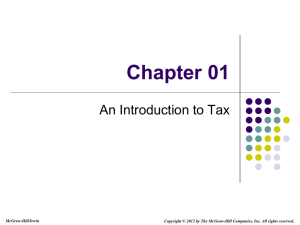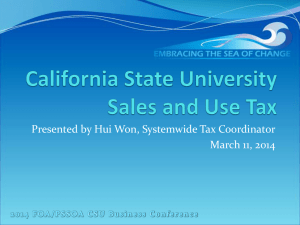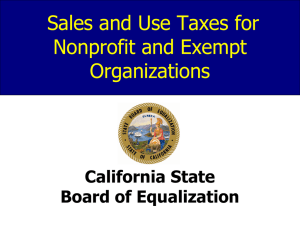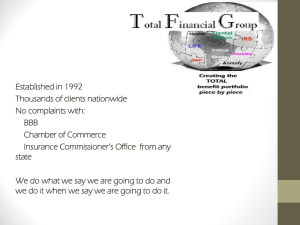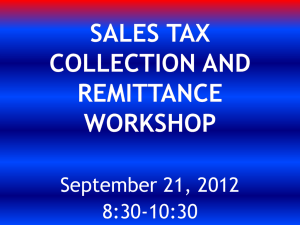Policy for Small Scale Entrepreneur
advertisement
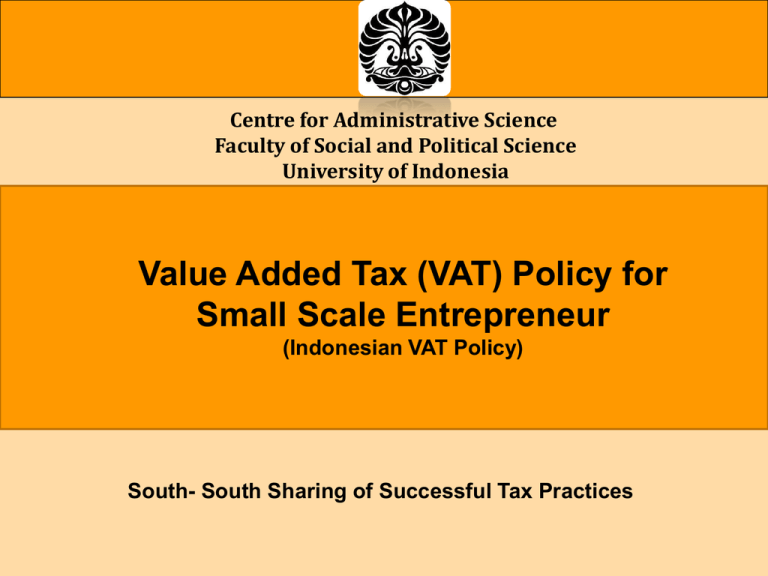
Centre for Administrative Science Faculty of Social and Political Science University of Indonesia Value Added Tax (VAT) Policy for Small Scale Entrepreneur (Indonesian VAT Policy) South- South Sharing of Successful Tax Practices 1. Background Indonesia adopted a VAT System in 1983 when tax reform was implemented including the a shift from a Sales Tax System to a Value Added Tax System. Indonesia VAT Law as latest amended by Law No. 42 in 2009. Based on article 4 (1) of VAT Law, “VAT shall be imposed on: a. b. c. d. e. f. g. h. Delivery of taxable goods within customs area conducted by enterpreneur Import of taxable goods Delivery of taxable services within customs area conducted by enterpreneur Utilization of intangiable taxable goods from outside customs area within customs area Utilization of taxable services from outside customs area within customs area Export of tangiable taxable goods by taxable enterpreneur Export of intangiale taxable goods by taxable enterpreneur Export of taxable services by taxable enterpreneur The consequence of VAT implementation: an entrepreneur who conducted delivery of taxable goods (intangiable taxable goods or tangiable taxable goods) and taxable services must register its business to be confirmed as Taxable Enterpreneur as regulated under Article 3A of VAT. A Taxable Enterpreneur is allowed to credit input tax against output tax. Article 9 VAT Law stated that: “ input tax in a tax period may be credited with output tax in the same tax period” For the administrative purpose, therefore Tax Invoice must be issued by taxable entrepreneur as media for credit mechanism for each: a. Delivery of taxable goods b. Delivery of taxable services c. Export of intangiable taxable goods d. Export of taxable services Taxable Enterpreneur are compulsory to collect, deposit and report Value Added Tax (VAT) and Sales Tax on Luxury Goods (STLG). For Small Scale Entrepreneur are allowed to choose whether as taxable supplies or not. Whereas, Small Scale Enterpreneur who choose to be confirmed as Taxable Enterpreneur are compulsory to carry out provision for Taxable Enterprises. Indeed, Small Scale Entrepreneurs who do not register as taxable enterpreneur will be exempted from taxable enterpreneur responsibilities. The aim of Indonesian government concessing small scale entrepreneur to be exempted from the responsibilities as taxable entrepreneur do is to support the development of small scale entrepreneur business activities. Small Scale Entrepreneur is the entrepreneur whose its total omzet from deliver taxable goods or supply taxable services is up to certain amount of money for a fiscal year. The threshold for omzet shall be stipulated by regulation of Ministry of Finance. The compulsory of Small Scale Entrepreneur as is Taxable Entrepreneur still debatable by VAT Expert. According to Schenk and Oldman: 1. Small business can either be exempt or subject to taxation under special sceme 2. The government may tax small business but may allow them to retain a percentage of the tax collected to compensate them for their substantially higher complience cost 3. Rather than requiring small business to account for taxes under a variation of the accrual method typically used to calculate VAT liability, they can be allowed to employ the cash method 4. One need not assign to the invoice the same critical weight that it has for larger taxpayers 5. Instead of requiring frequent periodic reporting of taxes, small business can be permitted to report their taxes annually, with periodic payment of estimated taxes. In conclusion, treatment for Small Scale Entrepreneurs should be different with Taxable Entrepreneur. Even if the small scale entrepreneur chooses to register as Taxable Entrepreneur, they should be given concession, as Tait stated: 1. Intended to have a large turn over but not yet reached 2. Incur large expenditure in one year 3. Expecting the income in the next year 4. Carrying out business activities at a level that does not reach the registration limit but that do not wish this information to be known by customers 5. To avoid any competitive disadvantage compared with other operators who are required to be registered. The category of entrepreneur shall be determined by minimum level or threshold of business activity. Then, the indicator of business activity shall be total turn over of taxable goods and services in particular period. However, there are many developing countries set the limit for that threshold less than Fiscal Affair Department International Monetary Fund (FAD IMF) suggested. Figure 1 Registration Thresholds Country National Currency USD (Approx) Australia AUD 75,000 AUS 47,000 Cambodia a. b. c. a) b) c) China None India Varies from state to state Indonesia IDR 600 million Japan None Malaysia Not yet decided Laos Kip USD 49,000 New Zealand NZD 40,000 USD 19,000 Philippines PHP 1,5 million USD 30,000 Singapore None Thaiwan None Thailand Bath 1,8 million Riel 125 million Riel 60 million Riel 30 million USD 30,000 USD 14,000 USD 7,000 USD 49,000 Source: PricewaterhouseCoopers, A Guide to VAT/GST in Asia Pacific 2009 kurs as published by PwC 2. Implementation in Indonesia In the beginning of VAT implementation (1983), government exempted levying VAT from Small Scale Entrepreneur. Then the policy changed over periods, level of threshold for period of: Policy Periode Policy (Approx) 1 April 1985 – 31 March 1989 a. Entrepreneur delivered taxable goods/taxable services no more than IDR 60,000,000 in a year b. The beginning capital to set up business no more than IDR 10,000,000 in a year 1 April 1989 – 31 December 1991 a. Entrepreneur delivered taxable goods no more than IDR 60,000,000 in a year b. Entrepreneur supplied taxable services no more than IDR 30,000,000 in a year c. Entrepreneur delivered both taxable goods/ and taxable services: Policy Periode Policy • IDR 80,000,000 in a year if delivery of taxable goods more than 50% from total omzet • IDR 30,000,000 in a year if supply of taxable services more than 50% from total omzet 1 January 1992 – 31 December 1994 a. Enterpreneur delivered taxable goods no more than IDR 120,000,000 in a year b. Enterpreneur supplied taxable services no more than IDR 60,000,000 in a year c. Enterpreneur delivered both taxable goods/ and taxable services: Policy Periode Policy • IDR 120,000,000 in a year if delivery of taxable goods more than 50% from total omzet • USD 29,350 in a year if supply of taxable services more than 50% from total omzet 1 January 1995 – 31 December 2000 a. Entrepreneur delivered taxable goods no more than IDR 240,000,000 in a year b. Entrepreneur supplied taxable services no more than IDR 120,000,000 in a year c. Entrepreneur delivered both taxable goods/ and taxable services: Policy Periode Policy • IDR 240,000,000 in a year if delivery of taxable goods more than 50% from total omzet • IDR 120,000,000 in a year if supply of taxable services more than 50% from total omzet 1 January 2001 – 31 December 2003 a. Entrepreneur delivered taxable goods no more than IDR 360.000.000 in a year b. Entrepreneur supplied taxable services no more than IDR 180.000.000 in a year c. Entrepreneur delivered both taxable goods/ and taxable services: Policy Periode Policy • IDR 360,000,000 in a year if delivery of taxable goods more than 50% from total omzet • IDR 180,000,000 in a year if supply of taxable services more than 50% from total omzet 1 January 2004 – Now • Since 2004, government stipulated that business activity threshold different between delivery of taxable goods and supplied of taxable services should not be applied. Thus, the minimum threshold for both would be IDR 600,000,000 3. Conclusion To promote the development of Small Scale Entrepreneur, the government should pay more attention to this type of business. It is suggested that government should concess facility for Small Scale Entrepreneur such as exemption from registration compulsory or several sugesstion as followed: a. To extent the limit of business threshold; or b. To promote enforcement of law for small scale entrepreneur who gain omzet more than threshold, if the limit of threshold will not be redetermined.


